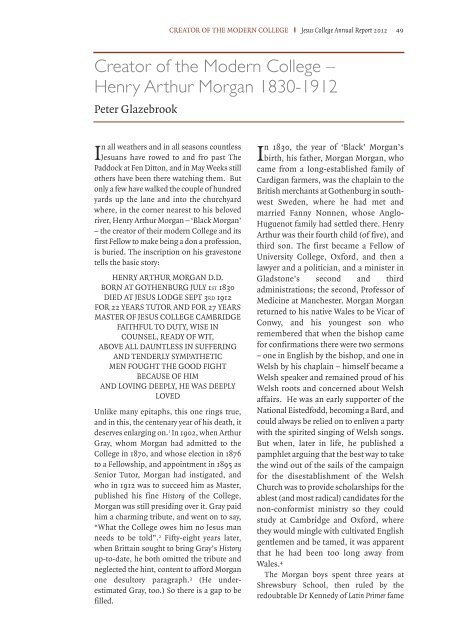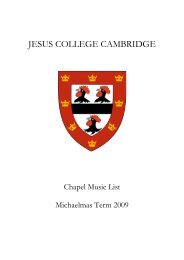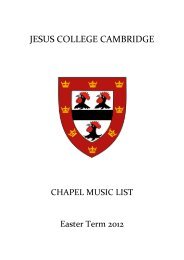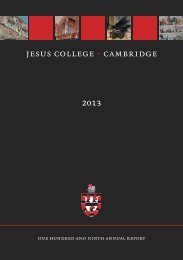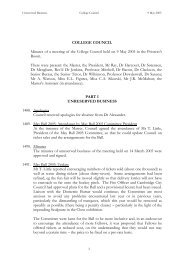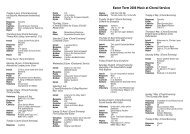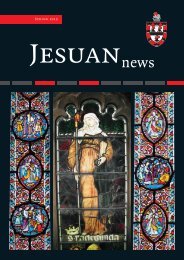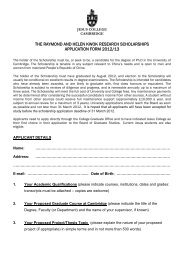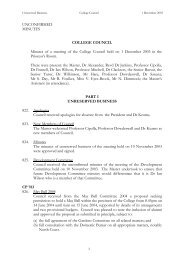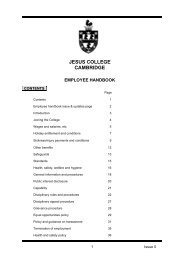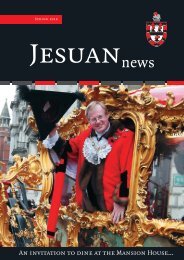2012 Annual Report - Jesus College - University of Cambridge
2012 Annual Report - Jesus College - University of Cambridge
2012 Annual Report - Jesus College - University of Cambridge
You also want an ePaper? Increase the reach of your titles
YUMPU automatically turns print PDFs into web optimized ePapers that Google loves.
CREATOR OF THE MODERN COLLEGE I <strong>Jesus</strong> <strong>College</strong> <strong>Annual</strong> <strong>Report</strong> <strong>2012</strong> 49<br />
Creator <strong>of</strong> the Modern <strong>College</strong> –<br />
Henry Arthur Morgan 1830-1912<br />
Peter Glazebrook<br />
In all weathers and in all seasons countless<br />
Jesuans have rowed to and fro past The<br />
Paddock at Fen Ditton, and in May Weeks still<br />
others have been there watching them. But<br />
only a few have walked the couple <strong>of</strong> hundred<br />
yards up the lane and into the churchyard<br />
where, in the corner nearest to his beloved<br />
river, Henry Arthur Morgan – ‘Black Morgan’<br />
– the creator <strong>of</strong> their modern <strong>College</strong> and its<br />
first Fellow to make being a don a pr<strong>of</strong>ession,<br />
is buried. The inscription on his gravestone<br />
tells the basic story:<br />
HENRY ARTHUR MORGAN D.D.<br />
BORN AT GOTHENBURG JULY 1ST 1830<br />
DIED AT JESUS LODGE SEPT 3RD 1912<br />
FOR 22 YEARS TUTOR AND FOR 27 YEARS<br />
MASTER OF JESUS COLLEGE CAMBRIDGE<br />
FAITHFUL TO DUTY, WISE IN<br />
COUNSEL, READY OF WIT,<br />
ABOVE ALL DAUNTLESS IN SUFFERING<br />
AND TENDERLY SYMPATHETIC<br />
MEN FOUGHT THE GOOD FIGHT<br />
BECAUSE OF HIM<br />
AND LOVING DEEPLY, HE WAS DEEPLY<br />
LOVED<br />
Unlike many epitaphs, this one rings true,<br />
and in this, the centenary year <strong>of</strong> his death, it<br />
deserves enlarging on. 1 In 1902, when Arthur<br />
Gray, whom Morgan had admitted to the<br />
<strong>College</strong> in 1870, and whose election in 1876<br />
to a Fellowship, and appointment in 1895 as<br />
Senior Tutor, Morgan had instigated, and<br />
who in 1912 was to succeed him as Master,<br />
published his fine History <strong>of</strong> the <strong>College</strong>,<br />
Morgan was still presiding over it. Gray paid<br />
him a charming tribute, and went on to say,<br />
“What the <strong>College</strong> owes him no <strong>Jesus</strong> man<br />
needs to be told”. 2 Fifty-eight years later,<br />
when Brittain sought to bring Gray’s History<br />
up-to-date, he both omitted the tribute and<br />
neglected the hint, content to afford Morgan<br />
one desultory paragraph. 3 (He underestimated<br />
Gray, too.) So there is a gap to be<br />
filled.<br />
I n 1830, the year <strong>of</strong> ‘Black’ Morgan’s<br />
birth, his father, Morgan Morgan, who<br />
came from a long-established family <strong>of</strong><br />
Cardigan farmers, was the chaplain to the<br />
British merchants at Gothenburg in southwest<br />
Sweden, where he had met and<br />
married Fanny Nonnen, whose Angl0-<br />
Huguenot family had settled there. Henry<br />
Arthur was their fourth child (<strong>of</strong> five), and<br />
third son. The first became a Fellow <strong>of</strong><br />
<strong>University</strong> <strong>College</strong>, Oxford, and then a<br />
lawyer and a politician, and a minister in<br />
Gladstone’s second and third<br />
administrations; the second, Pr<strong>of</strong>essor <strong>of</strong><br />
Medicine at Manchester. Morgan Morgan<br />
returned to his native Wales to be Vicar <strong>of</strong><br />
Conwy, and his youngest son who<br />
remembered that when the bishop came<br />
for confirmations there were two sermons<br />
– one in English by the bishop, and one in<br />
Welsh by his chaplain – himself became a<br />
Welsh speaker and remained proud <strong>of</strong> his<br />
Welsh roots and concerned about Welsh<br />
affairs. He was an early supporter <strong>of</strong> the<br />
National Eistedfodd, becoming a Bard, and<br />
could always be relied on to enliven a party<br />
with the spirited singing <strong>of</strong> Welsh songs.<br />
But when, later in life, he published a<br />
pamphlet arguing that the best way to take<br />
the wind out <strong>of</strong> the sails <strong>of</strong> the campaign<br />
for the disestablishment <strong>of</strong> the Welsh<br />
Church was to provide scholarships for the<br />
ablest (and most radical) candidates for the<br />
non-conformist ministry so they could<br />
study at <strong>Cambridge</strong> and Oxford, where<br />
they would mingle with cultivated English<br />
gentlemen and be tamed, it was apparent<br />
that he had been too long away from<br />
Wales. 4<br />
The Morgan boys spent three years at<br />
Shrewsbury School, then ruled by the<br />
redoubtable Dr Kennedy <strong>of</strong> Latin Primer fame


